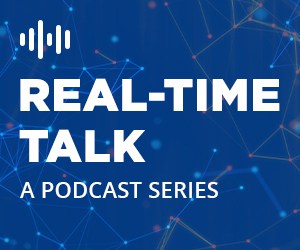
In this week’s real-time analytics news: VMware unveiled VMware Cloud, Arm introduced its new architecture, and more.
Keeping pace with news and developments in the real-time analytics market can be a daunting task. We want to help by providing a summary of some of the items our staff came across each week. Here are some of the news items from this week:
VMware unveiled VMware Cloud, a distributed, multi-cloud platform that enables organizations to accelerate application modernization across the data center, edge, and any cloud. VMware Cloud boosts developer productivity by enabling them to build and deploy to any cloud. The platform enables IT to modernize infrastructure and operations with better economics and less risk. With the launch of VMware Cloud, VMware is announcing new offerings that bring a more integrated experience to customers. These offerings include:
- VMware Cloud Universal: a flexible subscription that simplifies the purchase and consumption of VMware multi-cloud infrastructure and management services.
- VMware Cloud Console: a single monitoring and management environment for VMware Cloud infrastructure regardless of where it’s deployed.
- VMware App Navigator: a new offering for assessing and prioritizing app transformation initiatives across an entire application estate based on the value of each app.
Arm has introduced the Arm v9 architecture, which aims to meet the needs of AI, security, and specialized computing. For AI workloads, Arm partnered with Fujitsu to create the Scalable Vector Extension (SVE) technology, which is at the heart of Fugaku, the world’s fastest supercomputer. Building on that work, Arm has developed SVE2 for Armv9 to enable enhanced machine learning (ML) and digital signal processing (DSP) capabilities across a wider range of applications. To secure data, the Armv9 roadmap introduces the Arm Confidential Compute Architecture (CCA). Confidential computing shields portions of code and data from access or modification while in use, even from privileged software, by performing the computation in a hardware-based secure environment.
The Linux Foundation announced it will host the AsyncAPI Initiative. AsyncAPI is a specification and a suite of open-source tools that work with asynchronous APIs and event-driven architectures. AsyncAPI helps unify documentation automation and code generation, as well as managing, testing, and monitoring asynchronous APIs. It provides a language for describing the interface of event-driven systems regardless of the underlying technology and supports the full development cycle of event-driven architecture. AsyncAPI is considered a sister project of the OpenAPI Initiative, which is focused on synchronous REST communication and is also hosted by the Linux Foundation.
GE Digital announced the availability of new Professional Services offerings to help industrial companies accelerate realization of business outcomes such as improved efficiency, less waste, and higher quality. Quick Start for Industrial Advanced Analytics, Quick Start for Proficy Operations Hub, and Quick Start for OEE allow industrial companies to partner with GE Digital to deploy the company’s industry-leading, intuitive software with uniquely proven action plans for rapid digital transformation and continuous improvement. The solutions offer different capabilities, including:
- Quick Start for Industrial Advanced Analytics enables an industrial organization’s process engineers in AI and machine learning to accelerate problem detection, reduce variability, and optimize equipment and processes so that factors that are impacting process variability are identified quickly.
- Quick Start for Proficy Operations Hub helps industrial organizations to not only modernize their UI but also to merge data coming from different systems related to production KPIs, environmental health and safety, maintenance, and more.
- Quick Start for OEE allows plant production managers, shift leaders, and line operators to rapidly deploy a targeted MES solution for one production line and measure benefit realization in weeks.
Sumo Logic and AWS launched the Amazon CloudWatch Metric Streams, a fully managed, scalable, and low latency service that streams Amazon CloudWatch metrics to partners via Amazon Kinesis Data Firehose. AWS and Sumo Logic customers can now leverage AWS Kinesis Firehose for Metrics Source for streaming CloudWatch metrics into their Sumo Logic accounts, to help simplify the monitoring and troubleshooting of AWS infrastructure, services, and applications. Existing agentless methods to collect CloudWatch metrics from AWS infrastructure, services, and applications rely on the CloudWatch API; which uses a polling mechanism to detect and collect CloudWatch metrics, and therefore may need manual intervention for increasing the quota. With CloudWatch Metric Streams, customers can stream CloudWatch metrics without such dependencies.
Qlik announced it has deepened its partnership with Snowflake with the launch of a new joint solution that enables faster ingestion and on-boarding of analytics-ready SAP data to Snowflake through accelerated data pipeline creation and ongoing data streaming with Qlik Data Integration. Reinforced by Qlik’s status as a Snowflake Elite Partner and 2020 Partner of the Year in Data Engineering, customers and system integrators can deploy this integrated solution to increase the use and value of SAP data in modern cloud analytics efforts, including applying real-time analytics on the data.
Graylog announced the availability of Graylog Cloud. With the full features and functionality of Graylog Enterprise, Graylog Cloud offers choices to customers who want seamless data collection, rapid search, flexible analysis, and greater affordability without the hassle of maintaining and updating the systems it runs on. For IT professionals who solve security, operational, and application support issues, Graylog Cloud offers infrastructure cost savings coupled with immediate operational agility so organizations can quickly find meaning in data and take action.
IntelliSite released a managed service that enables cities and other communities to deliver smarter and safer environments. The service, SCaaS (Smart, Safe and Connected Communities as a Service), impacts public safety, intelligent transportation, healthy environments, and the security of the city infrastructure. The service is comprised of three elements. City-wide wireless and AI-powered surveillance cameras serve to measure everything from traffic and pedestrian flows and looking for blacklisted license plates. Complementing the cameras are hundreds of types of IoT devices that can detect items such as water tank levels, soil moisture, temperatures, pressures, and air quality. Second, a software dashboard delivers continuous data, correlations, and insights to decision-makers, who assess the immediate impact of recent changes. Finally, a 24/7 event monitoring service eliminates all false alarms and uses talk downs to deter activities.
Penguin Computing announced that it has collaborated with Red Hat and Seagate Technology to unveil its DeepData solution with Red Hat Ceph Storage, a high-performance, software-defined storage solution optimized for scale, throughput, and cost-effectiveness. The DeepData solution can be integrated into existing bare-metal, containerized, virtual, or cloud environments. It can be deployed as a stand-alone solution or in combination with other Penguin Computing solutions for data, HPC, AI/analytics, and cloud to provide an end-to-end workload-driven environment.
Matillion announced the general availability of Matillion ETL for Delta Lake on Databricks, enabling data professionals across a business to aggregate and share data in a single environment for improved cross-functional decision-making. The combination of Matillion ETL and Databricks provides enterprises access to insights from large, dynamic datasets on a unified platform, empowering data teams to take full advantage of modern lakehouse architecture. With cloud-native Matillion ETL for Delta Lake on Databricks, enterprise data teams create instantly shareable datasets between previously disparate analytics and data science environments.
Kinetica announced a new Tableau extension. The new extension overcomes previous limitations to visualizing billions of geospatial data points within Tableau, helping customers filter data reflected in real time on their map, track objects through time and space, or detect patterns with heat maps. Leveraging the Kinetica extension in Tableau will allow users who are not geospatial experts to incorporate location data into their analysis in the familiar Tableau interface at scale. Tableau users can tap into Kinetica’s accelerated geospatial visualization capabilities on the server side, to instantly display massive amounts of location data on a map in Tableau. By avoiding the limitations of traditional client-side visualization, like downsampling and simplification prerequisites, Kinetica’s server-side rendering allows Tableau users to interact with and navigate millions or billions of points dynamically.
Denodo announced Denodo Standard, a new data integration solution available on leading cloud marketplaces. Denodo Standard lowers the barriers to begin data integration by allowing organizations to purchase it directly from their cloud marketplace of choice – AWS, Microsoft Azure, and Google Cloud Platform. Denodo Standard provides all the capabilities to quickly get data integration projects into production. Featuring an intuitive web user interface with a no-code/low-code data design studio augmented by AI-powered suggestions and the option to choose from over 150 out-of-the-box connectors to various data sources, Denodo Standard delivers data quickly. The solution enables citizen integrators to connect to cloud data warehouses, data lakes, and SaaS applications and combine the data from these disparate sources into a unified view for consumption by business users via dashboards and reports or developers via APIs.
Cloudera announced the Cloudera Data Platform (CDP) is now available on Google Cloud. The addition of CDP for Google Cloud enables Cloudera to deliver on its promise to offer its enterprise data platform at global scale. Cloudera Data Platform on Google Cloud uses Cloudera’s Shared Data Experience (SDX) to create secure data lakes in an organization’s Google Cloud account and provision analytic and machine learning services in minutes instead of weeks. It replaces tedious scripting with ‘set it and forget it’ convenience. With CDP on Google Cloud, companies can easily migrate existing data pipelines to Google Cloud or quickly set up new ones that can ingest data from a number of existing or new data sources.
ADLINK Technology joined the Senseye-Ready ecosystem to offer predictive maintenance solutions supported by the Senseye ROI Lock guarantee. Through the Senseye Ready program, ADLINK edge AI platforms pair with Senseye PdM software, which tracks machine health and alerts users of potential machine failures before they occur, to ensure the predictive maintenance experience will work out-of-the-box. Based on previous deployments, the combined solution requires an initial setup and learning period of just five days and less than an hour for training on the Senseye application.
Text IQ announced the launch of its Unconscious Bias Detector, a software solution that uncovers hidden bias in the employee performance review process. The Text IQ Unconscious Bias Detector uses the company’s capabilities for understanding, categorizing, and analyzing unstructured information to detect patterns of bias in performance appraisal documents. The machine learning model identifies potential bias in categories such as race, gender, ethnic origin, and age. Organizations can then mitigate this hidden bias through education, coaching, and redesigned processes based on rigorous assessments and easy-to-understand examples.
Wind River announced its latest Wind River Studio innovations. Studio is a cloud-native platform for the development, deployment, operations, and servicing of mission-critical intelligent systems. The latest Studio capabilities, enable DevSecOps, security, mission-criticality, and collaboration through one single pane of glass and hosted in the user’s own public cloud instance. The general availability of the latest round of Studio capabilities gives companies the ability to build, deploy, operate, and service intelligent systems on the edge.
KALERIS launched Transport Analytics, a business intelligence offering to increase enterprise analytics across the rail supply chain. Transport Analytics visualization tools and intuitive dashboards for real-time analytics help users analyze large data sets, aggregate key performance indicators, and quickly identify and manage exceptions to improve asset utilization, inventory turns, and productivity. Transport Analytics supports numerous methods to ingest and distribute data and provides efficient data analysis, report generation, and collaboration tools. Transport Analytics includes a mobile application, supported by iOS, Android, and Windows 10, to increase user access to timely information and key performance metrics.
ABB and Nozomi Networks Inc. announced a joint agreement to address growing demand for improved Operational Technology (OT) cybersecurity solutions for energy, process, and hybrid industries. As part of its comprehensive cybersecurity portfolio, ABB will integrate Nozomi Networks’ advanced solutions for operational resiliency and real-time network visibility to assist ABB’s global automation and digitalization customers.
TigerGraph announced that the Technical University of Denmark (DTU), a leading university in the areas of technical and natural sciences, is using TigerGraph’s advanced graph analytics with machine learning and AI techniques to improve the treatment of acute lymphoblastic leukemia. The research generates enormous amounts of data with various other data points about the patient’s life, illness, and treatment. DTU opted for an on-premises graph database platform that would deliver the required performance and selected TigerGraph.
Real-time analytics news in brief:
Oracle launched new Oracle Cloud Lift Services that give Oracle customers expanded access to technical tools and cloud engineering resources to quickly migrate workloads to Oracle Cloud Infrastructure (OCI). Oracle now offers these resources – at no additional cost – to all existing and new Oracle Cloud customers worldwide.
Celonis, IBM, and Red Hat announced a global strategic partnership to help accelerate the adoption of the Celonis Execution Management System (EMS) and help deliver more flexibility and choice in how customers deploy the technology. The collaboration seeks to accelerate how customers apply process mining, intelligence, and automation to the core enterprise system functions and processes that drive business execution.
Accenture and Sumitomo Chemical established a joint venture SUMIKA DX ACCENT. The joint venture will leverage the power of artificial intelligence (AI), data analytics, and other technologies to transform operations and create new businesses at Sumitomo Chemical Group. Using Accenture’s industry and digital-transformation experience, the joint venture will optimize the company’s supply chain and promote intelligent automation in its operations, using AI, data analytics, and robotic process automation.
CircleCI announced a preview of significant additions to its build fleet with the introduction of Arm-based compute. As the footprint of Arm has grown, so has the demand for CI/CD solutions on Arm. CircleCI is now one of the few platforms to offer cloud-based CI/CD services for the Arm architecture due to its partnership with Amazon Web Services (AWS), allowing joint customers to build and test applications compiled for Arm without managing their own systems.
PTC announced the newest addition to its Vuforia augmented reality (AR) enterprise platform, the Vuforia Engine Area Targets offering, which supports the creation of immersive augmented reality (AR) experiences for spaces up to 300,000 square feet. Using Area Targets, industrial organizations can create AR interfaces within their facilities to enable employees to better engage with machinery and understand how the environment is being used.
airSlate announced today that its workflow automation, e-signature, and document management solutions are now available to research and higher education members of Internet2, a non-profit advanced technology community. Under the initial agreement, airSlate’s solutions will empower research and education institutions to immediately address a growing need to digitize and automate their document processes.
Duco announces the release of its new cloud-based data preparation product, giving non-technical users in mission-critical and regulated environments the ability to bring together data from disparate systems and sources without coding, and thereby accelerating their digital transformation journeys.
Atos has achieved Amazon Web Services (AWS) Mainframe Migration Competency status. This designation recognizes that Atos has proven solutions, practices, and customer success in migrating both mainframe applications and data to AWS. Achieving AWS Mainframe Migration Competency status differentiates Atos as an AWS Partner with a track record of success and deep domain expertise in mainframe workloads migration.
b.well Connected Health announced a partnership with Mastercard to provide individuals a simpler and more secure way to prove their identity online and in-person when accessing healthcare services. The b.well platform brings together patient data across providers, insurers, pharmacies, and a patient’s own apps and devices, so people can share their information, manage their medications, understand their costs, and receive personalized health insights and alerts based on real-time analytics and more.
If your company has real-time analytics news, send your announcements to ssalamone@rtinsights.com.
In case you missed it, here are our most recent previous weekly real-time analytics news roundups:





























